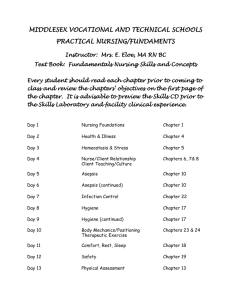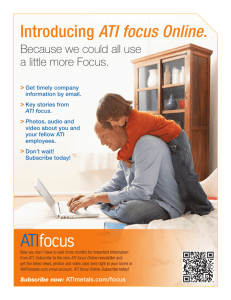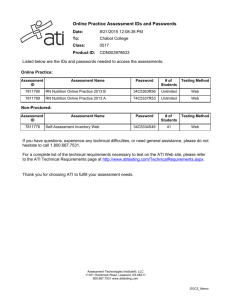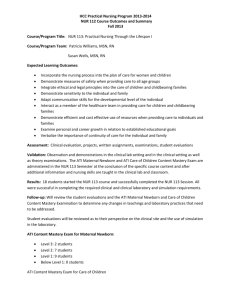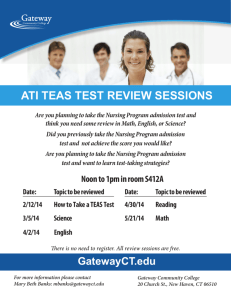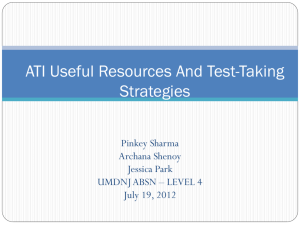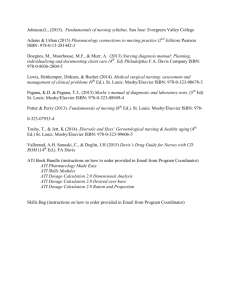ADN 220S Patchett 01-16-15-4d SP 15
advertisement
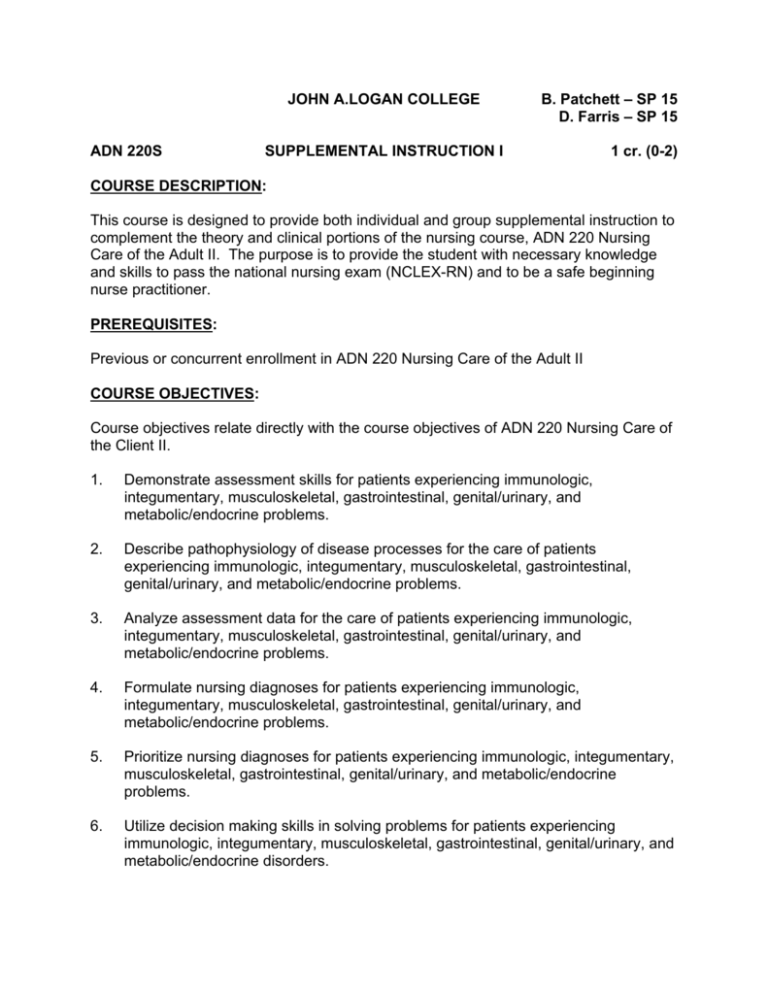
JOHN A.LOGAN COLLEGE ADN 220S B. Patchett – SP 15 D. Farris – SP 15 SUPPLEMENTAL INSTRUCTION I 1 cr. (0-2) COURSE DESCRIPTION: This course is designed to provide both individual and group supplemental instruction to complement the theory and clinical portions of the nursing course, ADN 220 Nursing Care of the Adult II. The purpose is to provide the student with necessary knowledge and skills to pass the national nursing exam (NCLEX-RN) and to be a safe beginning nurse practitioner. PREREQUISITES: Previous or concurrent enrollment in ADN 220 Nursing Care of the Adult II COURSE OBJECTIVES: Course objectives relate directly with the course objectives of ADN 220 Nursing Care of the Client II. 1. Demonstrate assessment skills for patients experiencing immunologic, integumentary, musculoskeletal, gastrointestinal, genital/urinary, and metabolic/endocrine problems. 2. Describe pathophysiology of disease processes for the care of patients experiencing immunologic, integumentary, musculoskeletal, gastrointestinal, genital/urinary, and metabolic/endocrine problems. 3. Analyze assessment data for the care of patients experiencing immunologic, integumentary, musculoskeletal, gastrointestinal, genital/urinary, and metabolic/endocrine problems. 4. Formulate nursing diagnoses for patients experiencing immunologic, integumentary, musculoskeletal, gastrointestinal, genital/urinary, and metabolic/endocrine problems. 5. Prioritize nursing diagnoses for patients experiencing immunologic, integumentary, musculoskeletal, gastrointestinal, genital/urinary, and metabolic/endocrine problems. 6. Utilize decision making skills in solving problems for patients experiencing immunologic, integumentary, musculoskeletal, gastrointestinal, genital/urinary, and metabolic/endocrine disorders. 2 7. Develop nursing care plans for patients experiencing immunologic, integumentary, musculoskeletal, gastrointestinal, genital/urinary, and metabolic/endocrine disorders. 8. Describe pharmacological regimens for patients experiencing immunologic, integumentary, musculoskeletal, gastrointestinal, genital/urinary, and metabolic/endocrine disorders. 9. Demonstrate clinical skills necessary in the care of patients experiencing immunologic, integumentary, musculoskeletal, gastrointestinal, genital/urinary, and metabolic/endocrine disorders. 10. Analyze strengths and weaknesses through ATI online practice tests. 11. Remediate deficient functional nursing knowledge areas identified by ATI. COURSE OUTLINE: January 25 – 31 February 1 – 7 February 8 – 14 February 9 (3-5 pm) FT This might be changed – it should be the Monday before your Met/Endo Final February 11 (3–5pm) PT Orientation Review of the syllabus ATI Transcript NCLEX-RN® questions scores Note cards due on Feb 2 ATI Transcript NCLEX-RN® questions scores Note cards due Feb 9 ATI Transcript NCLEX-RN® questions scores Note cards due Feb 16 ATI Transcript with 90% on Endocrine Content Mastery practice exam SIM MAN CLINICAL APPLICATION – DIABETES SIM MAN CLINICAL APPLICATION – DIABETES This might be changed – it should be the Wednesday before your Met/Endo Final February 15 – 21 ATI Transcript NCLEX-RN® questions scores Note cards due Feb 23 3 February 22 - 28 March 1 - 7 March 2 (3-5pm) FT This might be changed – it should be the Monday before your GI Final March 4 (3-5pm) PT This might be changed – it should be the Wednesday before your GI Final March 8 - 14 March 15 – 21 March 22 - 28 March 29 – April 4 April 5 - 10 April 6 (3-5pm) FT This might be changed – it should be the Monday before your GU Final April 8 (3-5pm) PT This might be changed – it should be the Wednesday before your GU Final April 11 - 17 ATI Transcript NCLEX-RN® questions scores Note cards due March 2 ATI Transcript NCLEX-RN® questions scores Note cards due March 9 ATI Transcript with 90% on Gastrointestinal Content Mastery practice exam SIM MAN CLINICAL APPLICATION PRESENTATION – GI SIM MAN CLINICAL APPLICATION PRESENTATION – GI SPRING BREAK ATI Transcript NCLEX-RN® questions scores Note cards due March 23 ATI Transcript NCLEX-RN® questions scores Note cards due March 30 ATI Transcript NCLEX-RN® questions scores Note cards due April 6 ATI Transcript with 90% on Renal and Urinary Content Mastery practice exam ATI Transcript NCLEX-RN® questions scores Note cards due April 12 SIM MAN CLINICAL APPLICATION PRESENTATION – RENAL SIM MAN CLINICAL APPLICATION PRESENTATION – RENAL ATI Transcript NCLEX-RN® questions scores Note cards due April 19 4 April 18 - 24 April 20 - 26 April 27 – May 3 May 5 – May 10 ATI Transcript NCLEX-RN® questions scores Note cards due April 21 ATI Transcript with 90% on Perioperative Content Mastery practice exam ATI Transcript with 90% on Immune Content Mastery practice exam ATI Transcript NCLEX-RN® questions scores Note cards due April 28 ATI Transcript NCLEX-RN® questions scores Note cards due May 6 (last due date) ATI Transcript with 90% on Neuro/Musculoskeletal Content Mastery practice exam SimMan Dates FULL – TIME ADN Please note these dates may change based upon where you are in the course. Feb 9 (3 – 5pm) Endocrine SImMan Case Study March 2 (3 – 5pm) GI SimMan Case Study April 6 (3 – 5pm) Renal SimMan Case Study PART – TIME ADN Please note these dates may change based upon where you are in the course. Feb 11 (3 – 5pm) Endocrine SImMan Case Study March 4 (3 – 5pm) GI SimMan Case Study April 8 (3 – 5pm) Renal SimMan Case Study COURSE REQUIREMENTS: Before a student can utilize critical thinking skills, the student must possess foundational nursing knowledge. This class will help the student to identify areas of weakness so that the student can remediate those areas. This class is a resource to assist the student to be more successful for the NCLEX-RN® Exam and to enhance the student’s entry into nursing practice. Students are required to complete one (1) hour (equivalent to 60 questions) on NCLEXRN® type questions from a RN review book or ATI each week. Students are required to attend all Sim Man presentations. Students are required to actively participate each week in supplemental learning activities through Assessment Technologies Institute (ATI). 5 Verification of participation in the above activities is required. The student is to be engaged in the Online Practice Assessments through ATI. The ATI Online Practice Assessments have been developed based upon the NCLEX-RN® blueprint. Thus, active participation in the ATI assessments should enhance the student’s success on the NCLEX-RN® and prepare the graduate for entry into nursing practice. ATI recommends that the student continue taking the online practice assessment exams until the student makes a score of 90%. The student should allow a 48 hour period between taking assessments. Each Monday/Wednesday, the student is expected to turn in a copy of their ATI transcript which demonstrates active participation in the online practice assessment exams. In addition, the student needs to turn in their ATI “Topics to Review” or “Focused Remediation” plan along with corresponding note cards. The student is required to identify from ATI their areas of deficiencies either through “Topics to Review” or “Focused Remediation”. “Focused Remediation” provides the student with actual page numbers in the ATI resource books to obtain core foundational nursing knowledge. The student needs to fill out a note card on at least three (3) identified areas of concern / review. Below is an example of three note cards. Note Card Example #1: Restraints Restraints - ATI Fundamentals Resource Book Use as a last resort Emergent situation Danger to self or others Must have order Primary health care provider must see within an hour. 2 finger space Neurosensory checks Check frequently Remove restraints frequently (ROM) Document frequently Note Card Example #2: Hydrocolloid Dressings Hydrocolloid Dressings - ATI Fundamentals Resource Book Occlusive Swells in presence of exudate Can leave on 5 days Maintains a granulating bed Note Card Example #3: Wound Healing Stage II 6 Wound Healing Stage II - ATI Fundamentals Resource Book Superficial Partial thickness Abrasion, shallow crater May be painful Takes several weeks to heal Moist healing environment (saline, occlusive) Nutritional supplements Analgesics Each Monday/Wednesday, the student will be required to turn in a copy of their ATI transcript, NCLEX-RN scores and three note cards. The student will be allowed 2 late opportunities to turn in their assignments. If the student has a third late situation, then the student may be required to meet with the DON and ADN faculty and the student may receive a failing (E) grade for the course. A failing grade in ADN 220S Supplemental II does not allow the student to pass ADN 220 Nursing Care of the Adult II as the syllabus in that class requires that the student follows an educational remediation plan. Please remember that a nurse is unable to do critical thinking if the foundational nursing knowledge is weak. This course provides an opportunity for the student to identify areas of concern in nursing knowledge and to remediate those areas of concern. The student’s progress in ADN 220S Supplemental II will be shared with the nursing instructors in ADN 220 Nursing Care of the Adult II and ADN 221 Family Nursing. Student Success Center (Room C219). Services available for students include tutoring (both scheduled one-on-one tutoring and walk-in tutoring) and Disability Support Services. Students can drop in during the hours of operation for tutoring in the Math Help Room (C219 and C223) or the Biology Help Room (C243A). To receive one-onone tutoring, students should make a request early in the semester in the Student Success Center. The Student Success Center is also the place to arrange accommodations. John A. Logan College will make reasonable accommodations for students with documented disabilities. Contact the coordinator of Disability Support Services, Room C219B, ext. 8516, for more information. The coordinator must determine eligibility and arrange appropriate academic accommodations. However, it is the student’s responsibility to register in advance of a school term with Disability Support Services and to turn in a class schedule each term to ensure accommodations are arranged. Free educational workshops are also provided by the Student Success Center throughout the semester. For more information, visit the Student Success Center website at www.jalc.edu/student-success-center. 7 English Writing Center/Tutoring. For assistance with writing assignments in any college courses, students are encouraged to visit the Writing Center in C214. English instructors are available for one-on-one tutoring each semester during hours posted at the center. Financial Aid. Students who receive financial assistance and completely withdraw from classes prior to 60% of the semester being completed (approximately 2-3 weeks after midterm) could be responsible to return a portion of their Federal Pell Grant award. Prior to withdrawing from courses, students should contact the Financial Aid Office. Course Withdrawal Information. It is expected that you will attend this class regularly. If you stop attending for any reason, you should contact your advisor and withdraw officially to avoid the posting of a failing grade (an E) to your transcript. It is also advisable to discuss the situation with your instructor before dropping. Administrative Withdrawal. A student may be withdrawn from a class for lack of attendance/participation as defined below. Logging into an online course is not sufficient to be considered participation. Participation for online courses is defined as an active process and may include posting/sending assignments to the drop box or instructor’s email, participating in online discussion boards, taking quizzes or exams, or otherwise communicating and/or participating in some manner that is approved by the instructor. A student who has been administratively withdrawn from class will receive an email notification from the Admissions Office. This notification will outline the student’s appeal options if the student wishes to re-enroll in the course. Face-to-Face Class (8 or 16 weeks) Online Class (8 week) Online Class (16 week) Student may be withdrawn from class if the student has missed four (4) consecutive class periods without prior notification to the instructor of the absences. Student may be withdrawn from class if the student has not participated (as indicated by activity reports) in the online class for the equivalent of one week. Student may be withdrawn from class if the student has not participated (as indicated by activity reports) in the online class for the equivalent of two weeks. Safety Review Request. Our safety at JALC is everyone’s responsibility! Faculty, staff, and students are encouraged to use the Safety Review Request, https://www.jalc.edu/safety-review-request-form link on the JALC home page or contact Campus Safety directly (Ext. 8218 or Room E105) to report safety concerns or questions. This statement comes from the John A. Logan College Campus Violence Prevention Committee. Academic Dishonesty Individuals are expected to demonstrate integrity in their academic endeavors throughout their college careers. Practices such as cheating on examinations, plagiarism, fraud, misrepresentation or falsification of data, theft, destruction of 8 examinations or papers, alteration of records and/or communication of examination questions and other acts of academic dishonesty are not acceptable behavior. Any of these practices will result in failure of the course and will result in dismissal from the nursing program for one year. At the end of one year, the Re-entry policy will be followed in the Nursing Handbook. Clinical Skills Students Should Pursue: Endocrine Blood glucose testing Insulin injection Gastrointestinal Paracentesis Albumin transfusion Colostomy irrigation Closed wound drain Evisceration and dehiscence NG tubes Gastric suction Gastrostomy Surgical patients Staple removal Genital-Urinary Continuous bladder irrigation Straining urine Dialysis Hemodialysis Immune Epi-pen Muscoskeletal Casts Cervical collar Crutches Hip Care Knee replacement Mechanical traction Integumentary Burn care Mechanical debridement Pressure ulcers 9 METHOD OF EVALUATION: There are certain characteristics expected of a “professional registered nurse” by the public we serve. The following characteristics are expected to be exhibited by ADN nursing students to pass this course: integrity, honesty, caring, self-direction, selfmotivation, commitment, and respect. The final grade for ADN 220S Supplemental II will be a P (pass) ONLY IF the student has had: • • • • • Active participation in ATI online practice assessments and remediation Achievement of a score of 90% on each practice assessment Attendance at Sim Man presentations Verification of participation in remediation (3 note cards) turned in weekly (Monday/Wednesday) Verification of participation in NCLEX-RN® questions turned in weekly (Monday) METHOD OF PRESENTATION: Assessment Technologies Institute (ATI) online practice assessments (without rationales, with rationales), “Focused Remediation”, ATI Resource books, ATI DVDs, Blackboard website, internet, case studies, Sim Man demonstration and clinical application. REQUIRED TEXTBOOKS: Ackley, B., and Ladwig, G. (2014). Nursing Diagnosis Handbook: An Evidence-Based Guide to Planning Care (10th ed.). St. Louis: Mosby. ISBN: 978-0-323-07150-5. Adams, M., Joephson, D., Holland, L. (2014). Pharmacology for Nurses: A Pathophysiologic Approach. (4th edition). Upper Saddle Rive, NJ: Prentice Hall. ISBN-13: 978-0-13-302618-4 Springhouse. (2012). Lippincott Nursing Procedures (6th edition). Philadelphia: Lippincott, Williams & Wilkins. ISBN-10: 0-7817-8689-4 ISBN-13: 978-0-7817-8689-8. Vallerand, A. H. and Sanoski, C. (2012). Davis's Drug Guide for Nurses (13th ed.). Philadelphia: F. A. Davis Company. ISBN-10: 0803628331 | ISBN-13: 978-0803628335. Ignatiavicius, D. D. and Workman, M. L. (2013). Medical-Surgical Nurisng: PatientCentered Collaborative Care (7th ed.). Saunders. ISBN: 978-1-4160-3762-0 and ISBN: 978-1-4160-4903-6. Jarvis, Carolyn. (2012). Physical Examination and Health Assessment (6th edition). Saunders. ISBN: 978-1-4377-0151-7. 10 Murray, M. & Atkinson, L. (2000). Understanding the Nursing Process: In a Changing Care Environment (6th edition). St. Louis: McGraw-Hill Co., Inc. ISBN-13: 978-0-07135078-5. STRONGLY RECOMMENDED TEXTBOOKS ANA. ANA Standards of Care: General Medical/Surgical Standards. Pagana, K. & Pagana, T. (2011). Diagnostic and Laboratory Test Reference (10th edition). St. Louis: Mosby, Inc. ISBN: 978-0-323-07405 NCLEX-RN® Review Book State of Illinois. (2007). Nursing and Advanced Practice Nursing Act. Springfield. INSTRUCTOR: Barbara Patchett, RN, MSN, PhD Office G218 desk #4 barbarapatchett@jalc.edu 985-3741, ex 8864 (office) 751-1918 (cell/text) Office Hours: Posted Donna Farris, RN, MSN Office G218E 985-3741, ex 8620 (office) 995-2678 (home) Office Hours: Posted DATE: Spring, 2015 John A. Logan College Telephone Numbers Carterville Campus Carterville and Williamson County ................................. (618) 985-2828, (618) 985-3741 Carbondale and Jackson County .................................. (618) 457-7676, (618) 549-7335 Du Quoin area .......................................................................................... (618) 542-8612 West Frankfort area.................................................................................. (618) 937-3438 Crab Orchard, Gorham, and Trico Areas ................................................. 1-800-851-4720 Alongi DQ Extension Center ................................................................. (618) 542-9210 West Frankfort Extension Center........................................................... (618) 932-6639 John A. Logan College does not discriminate on the basis of race, religion, color, national origin, disability, age, sexual orientation, or gender orientation. 01-16-15-4d SP 15
